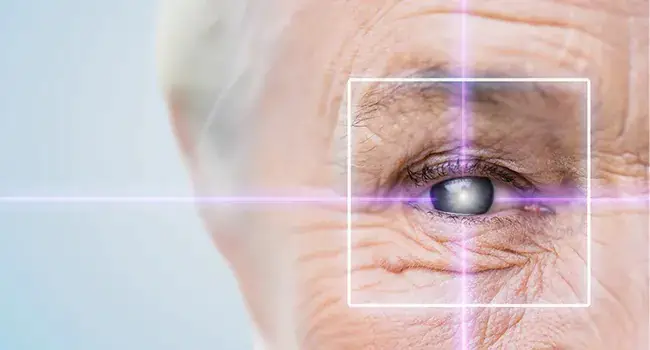Cataracts and glaucoma are two of the most common eye conditions, often occurring together in older adults. Managing these conditions simultaneously can be challenging, especially when considering surgical intervention. Patients frequently ask, “Can you have cataract surgery with high eye pressure?” The answer is yes, but it requires careful evaluation and planning.
First, let’s understand a little more about both the conditions.
Understanding Cataracts and Glaucoma
Cataracts develop when the eye’s natural lens becomes cloudy, impairing vision. This condition is treated through cataract eye surgery, where the cloudy lens is removed and replaced with an artificial lens.
Glaucoma, on the other hand, is a group of eye conditions that damage the optic nerve, often due to increased intraocular pressure (IOP). Left untreated, glaucoma can lead to irreversible vision loss. Eye surgery for glaucoma is often necessary when medications and other treatments fail to control high eye pressure.
Also Read: Everything you need to know about cataracts
Can You Have Cataract Surgery with High Eye Pressure?
Patients with glaucoma can undergo cataract eye surgery, provided the condition is managed appropriately. In fact, cataract surgery can sometimes lower intraocular pressure (IOP), which is beneficial for glaucoma patients. However, certain factors must be considered:
- Severity of Glaucoma: Patients with advanced glaucoma require extra care to prevent complications.
- Eye Pressure Levels: Pre-surgery management of high eye pressure is crucial to minimise risks.
- Combination Procedures: In some cases, cataract surgery may be combined with glaucoma surgery for better outcomes.
Does Cataract Surgery Lower Eye Pressure?
Yes, cataract eye surgery has been shown to reduce IOP in many patients. By removing the cloudy lens, the surgery can improve the flow of aqueous humour (fluid inside the eye), thereby lowering pressure. This effect is more pronounced in patients with narrow-angle glaucoma. In patients with open-angle glaucoma, the reduction in pressure is less dramatic, but it can still help stabilise the condition.
However, it is essential to note that cataract surgery alone is not a cure for glaucoma, and additional treatments may still be necessary.
In conclusion, when glaucoma coexists with cataracts, combining glaucoma surgery with cataract surgery is often a viable option because this approach addresses both conditions simultaneously, reducing the need for multiple procedures.
Benefits of Combined Surgery for Cataracts and Glaucoma
Combining cataract eye surgery with glaucoma treatment offers several advantages:
- Improved Vision: Cataract removal enhances visual clarity, while glaucoma surgery preserves optic nerve health.
- Lower Eye Pressure: Procedures like trabeculectomy or the insertion of an eye stent can significantly reduce IOP.
- Fewer Procedures: A single combined surgery reduces the risks and inconvenience associated with undergoing multiple surgeries.
- Better Long-Term Outcomes: Managing both conditions together can lead to better control of glaucoma progression.
Complications of Cataract Surgery with Glaucoma
While cataract eye surgery is generally safe, combining it with glaucoma treatment can increase the complexity of the procedure. Potential risks include:
- IOP Spikes: Temporary increases in eye pressure can occur after surgery.
- Inflammation: Glaucoma patients may experience more post-operative inflammation.
- Damage to the Optic Nerve: Patients with advanced glaucoma are at a higher risk of optic nerve injury.
- Prolonged Recovery: Healing may take longer when dealing with two conditions.
To minimise these risks, a thorough pre-surgery assessment and customised surgical plan are essential.
How to Prepare for Surgery?
If you’re considering cataract eye surgery while managing glaucoma, here’s how to prepare:
- Consult a Specialist: Seek advice from an experienced ophthalmologist who understands the complexities of both conditions.
- Control Eye Pressure: Ensure your IOP is well-controlled before surgery using medications or laser treatments.
- Discuss Combination Options: Explore the possibility of combining cataract surgery with glaucoma procedures, such as eye stent placement.
- Follow Pre-Surgery Instructions: Follow all pre-operative guidelines, including stopping certain medications as advised.
Post-Surgery Care
Recovery from combined cataract and glaucoma surgery requires close monitoring:
- Medication Adherence: Use prescribed eye drops to prevent infection, reduce inflammation, and control IOP.
- Follow-Up Appointments: Regular check-ups are crucial to monitor healing and assess the success of the procedure.
- Protect Your Eyes: Avoid strenuous activities and protect your eyes from injury during recovery.
Take the first step toward healthier eyes Book an Appointment with Centre for Sight in India!
Frequently Asked Questions
Yes, glaucoma can be treated with surgery, including procedures like trabeculectomy and minimally invasive techniques such as eye stent placement to lower IOP.
Potential complications include IOP spikes, inflammation, and prolonged recovery. Advanced glaucoma patients are at higher risk of optic nerve damage.
Having both glaucoma and cataracts can worsen vision, as cataracts cloud the lens and glaucoma damages the optic nerve. Proper management, often through combined surgery, can address both conditions effectively.
Yes, patients with glaucoma can safely undergo cataract eye surgery, often combined with a glaucoma procedure like an eye stent to manage high eye pressure.
Patients with uncontrolled eye infections, severe medical conditions, or advanced glaucoma with extensive optic nerve damage may not be ideal candidates for cataract surgery.
Recovery from combined surgery typically takes 4-6 weeks, though healing varies by individual. Regular follow-ups are essential to monitor eye pressure and ensure proper healing.





